





 By ZACHARY JARRELL
By ZACHARY JARRELL
CINCINNATI – In the crowded back room of Good Judy’s – an LGBTQ bar in Cincinnati’s Northside neighborhood –drag queen Stixen Stones appeared from behind a black curtain, dressed in transgender pride colors. Her outfit prominently displayed a message: “I am not a crime.” Stixen Stones, a 31-year-old transgender woman, then went to center stage, mouthing the words to a recording of Andrea Gibson’s poem “Your Life.”
With an intense stare and expressive motions, she descended a makeshift runway that split the crowd before returning to the stage. Her castmates piled in the narrow doorway that hid backstage to get a peek of the performance.
The crowd was silent as the speaker played: “They’re going to keep telling you/you are a crime of nature./And you’re going to look at all of your options/and choose conviction.”
The American Civil Liberties Union is tracking at least 430 anti-LGBTQ bills nationwide this year – ranging from transgender healthcare bans to limits on how LGBTQ issues can be discussed in schools, like in years past.
“It kind of puts us back in Stonewall territory,” Stixen Stones said.
This year has seen a sort of evolution in legislation targeting queer people, LGBTQ and legal experts said, with an influx of bills targeting drag performers as conservatives rail against drag story times – where drag artists read children’s books to kids. It’s a development that has heightened fears in the LGBTQ community, of which drag is an integral part.
“I think they’re using [anti-drag legislation] as a smokescreen, as a distraction to push something even more gruesome [anti-transgender legislation] that will literally impact lives,” said P.H. Dee, a 34-year-old drag queen in Cincinnati.
As more and more anti-LGBTQ bills are introduced, experts said, right-wing extremists have felt emboldened –increasingly targeting the LGBTQ community with hateful rhetoric and violent demonstrations.
“It’s hard to ignore,” said Vanta Black, a 23-year-old nonbinary drag performer in Cincinnati. “I feel like I would be ignorant to just be like, I’ll go play dress up and nobody’s going to be bothered by it.”
Cincinnati, positioned in the southwest corner of Ohio, has taken big leaps in LGBTQ equality over the last decade, according to the Human Rights Campaign – the largest LGBTQ organization in the country. As has Covington, Kentucky, the Queen City’s neighbor on the other side of the Ohio River.
Since 2012, the HRC has released its Municipal Equality Index, which assigns scores – from zero to 100 – to cities based on how inclusive their laws, policies and services are.
In the report’s first year, the HRC gave Cincinnati a 77 –scoring particularly low, 0, in the “relationship recognition” category for lack of a domestic partner registry as samesex marriage was illegal on both a federal and state level. Columbus, for comparison, scored a 12 in the category that same year.
tainly use more diversity, but I think we are a really creative and diverse group here in Cincinnati.”
She added: “On any given night, no matter where you go, you’re gonna see a lot of different types of entertainers, depending on which bar you go, and I love that.”
Vanta Black, who is new to the city’s drag scene, shared a similar sentiment: “We just have a very unique drag scene. It’s very open. There are a lot of different places where people can find where they belong. It’s not just one type of drag that’s validated here.”
Still, the city’s – and country’s – progress is being overshadowed by the legislation aimed at LGBTQ people.
“It’s been 50 years [since Cincinnati Pride started], and things have progressed so much,” Hitch said. “But then these bills get introduced, and it feels like we’ve taken two steps forward and two steps back.”
“That poem has always spoken to me – just the way that it describes trans joy,” Stixen Stones said in an interview after the show. “It gives me hope whenever I listen to it because it’s like, you really can have this really beautiful life that you get to choose, even though you’re gonna deal with some hardships.”
It was a chilly Saturday night last month, and Stixen Stones was co-hosting what she called a “trans trauma night” with fellow Good Judy’s performer Kiara Chimera – a night that put the political landscape for queer people at center stage.
In recent years, state legislatures across the country – including in Ohio, Kentucky and Indiana (parts of each state make up the Cincinnati metropolitan area) – have filed, advanced and, in some cases, passed legislation targeting LGBTQ people, namely transgender youth.
However, it wouldn’t be long until Cincinnati received perfect 100s from the HRC, 2015 being the first year the city did so – and it has continued the streak ever since.
Covington, on the other hand, was added to the list in 2015 – coming in with a 57 overall score. It took the Northern Kentucky city longer to climb up to a perfect score, achieving it in 2020 and again in 2022.
“Cincinnati, it’s come a long way in the last 10, 15 years, and it’s definitely more progressive than it was,” said Jake Hitch, director of communication for Cincinnati Pride. “I think we still have some room to grow, but it’s definitely progressed.”
Cincinnati’s drag scene has also seen a similar evolution, Stixen Stones, who describes her drag as alternative, said.
“It’s definitely changed a lot,” she said, adding: “I think we’re really seeing a lot of diversity – I mean, we can cer-
In early March, Tennessee Gov. Bill Lee, a Republican, signed the nation’s first bill restricting drag shows. The signing came after a 1977 high school yearbook photo appearing to show Lee in drag surfaced online – the governor called a reporter’s question about the photo “ridiculous.”
The legislation, which was set to go into effect on April 1 before a federal judge placed a temporary hold on it, bans “adult cabaret entertainment” – including “male or female impersonators” – from public property or in locations where minors can view it. The original bill was amended to define adult cabaret entertainment as “adult-oriented performances that are harmful to minors, as such term is defined under present law.”
CONTINUES ON PAGE 04
‘People look to me and my fellow performers for hope, guidance’P.H. DEE performs at Alcove by Mad Tree Brewing in Cincinnati’s Over-the-Rhine neighborhood on Sunday, March 19. (Photo by Zachary Jarrell) STIXEN STONES, 31, performs Andrea Gibson’s poem ‘Your Life’ at Good Judy’s, an LGBTQ bar in Cincinnati’s Northside neighborhood, on Saturday, March 18. (Photo by Zachary Jarrell)

CONTINUED FROM PAGE 02
“There’s some commentary suggesting that this means that some drag may actually be protected, so long as it’s not falling into the legal category of obscenities,” said Ryan Thoreson, an assistant law professor at the University of Cincinnati College of Law. “But I think what’s worrying about a lot of these bills, even when they’re amended that way, is that they have an enormous chilling effect, with performers not knowing what is and isn’t permissible with law enforcement.”
Supporters of the bill claim that the legislation is necessary to safeguard children. In an interview with CNN, one of the legislation’s lead sponsors, Tennessee Senate Majority Leader Jack Johnson, a Republican, clarified that the law “is not targeting any group of people.”
“It does not ban drag shows in public,” he said. “It simply puts age restrictions in place to ensure that children are not present at sexually explicit performances.”
But others see the legislation as vague, unnecessary and a violation of the First Amendment. Though the word “drag” is not in the bill – and some legal experts think the law, as written, does not apply to drag as they know it – many are uncertain about how the law will affect Pride parades, drag performances, and even transgender and nonbinary people.
And the Tennessee law is similar to legislation introduced in at least 14 other states, including Kentucky.
“Some of [the anti-drag bills], on their face, purport to really only go after performances that are sexual in nature,” said Sarah Warbelow, legal director for the HRC. “But the way that they’re written is going to have a chilling effect on all drag performances, particularly where a minor is or could be present.”
Warbelow did make it clear that most of the bills targeting drag performances are not “done in such a way that an average trans person walking down the street in the middle of the afternoon would need to be fearful that these laws could be used against them.”
Kentucky, a state where Cincinnati drag performers often work, saw its own bill targeting drag performances – written similarly to Tennessee’s law. After Republican lawmakers in the state’s Senate passed the legislation, it died in the House after not receiving enough readings before the veto period.
Still, P.H. Dee – who often crosses the Ohio River for performances – said, “it’s terrifying that this is getting the traction and the attention that is.”
According to the ACLU, Ohio has introduced four anti-LGBTQ bills – none aimed at drag performances. Indiana, similarly, has introduced bills aimed at the LGBTQ community, 18, but not drag.
But that doesn’t mean they won’t.
“Almost any state is at risk of seeing a bill like this,” Thore-
son said, adding that “there are lawmakers in, I think, every state who are at least interested in making a political name for themselves by introducing these types of bills.”
P.H. Dee said.
Earlier this year, white supremacists violently protested a drag storytelling event outside of Akron at Wadsworth’s Memorial Park while shouting racist and homophobic slurs. The event, “Rock-n-Roll Humanist Drag Queen Story Hour,” did proceed as planned, according to the Akron Beacon Journal.
The events came after a mass shooting at an LGBTQ nightclub in Colorado Springs, Colorado, that killed five people. Anderson Lee Aldrich, 22, who is currently on trial for the killings, ran a neo-Nazi website, according to a detective’s testimony.
Though there has been no documented anti-LGBTQ protest in Cincinnati recently, the drag performers who spoke with the Blade said they feared the threat of one.
“Over time, especially as some of these laws start to pass, we are really seeing a future in which queer spaces can be targeted, and queer people can be targeted, more than they already are,” Stixen Stones said, adding that “it’s scarier when the government is kind of giving the OK.”
On March 19, P.H. Dee hosted a Dolly Parton-themed drag brunch in Cincinnati’s Over-theRhine neighborhood. Dressed in a yellow fringe dress and bleach blond wing, she held the mic and delivered a speech about the state of the country for LGBTQ people – serving, especially, as a call to action for allies.
‘It certainly can happen
Though many anti-LGBTQ bills don’t become law – 91% of such legislation failed to become law last year, according to the HRC – LGBTQ advocates and right-wing extremism experts said hate groups, like the Proud Boys, could be seeing the legislation as a sort of license to target drag events.
“I think that the legislation gives cover to these groups,” said RG Cravens, a senior research analyst at the Southern Poverty Law Center’s Intelligence Project, adding that “politicians certainly are lending credibility, lending that kind of legitimacy to these, many times, violent actions.”
And it’s more than politicians, Cravens said, “there’s a right-wing media environment that mobilizes these groups.”
That includes Fox News host Tucker Carlson and popular social media account Libs Of TikTok, among others.
Last year, there were at least 124 anti-LGBTQ protests and threats targeting specific drag events, according to GLAAD –the world’s largest LGBTQ media advocacy group.
In December, right-wing groups – including the Patriot Front, Proud Boys and White Lives Matter Ohio, all of which are classified as hate groups by the SPLC – protested a drag queen story hour in Columbus. Some donned bulletproof vests and carried military-style assault weapons, while others flashed Nazi salutes. The event, which was meant to build literacy and promote inclusivity, was canceled.
“Columbus is a much more progressive city than Cincinnati is, so if it can happen there, it certainly can happen here,”
“[LGBTQ people] are our own echo chamber, right,” she said in an interview. “It’s really up to the allies to do the outreach because they just kind of have to be that middle person, that conduit that helps the people who don’t see our humanity, see our humanity.”
Stixen Stones also spoke about the importance of allies in the fight against anti-LGBTQ legislation.
“It’s really an ally’s job to speak out for us to the people that we can’t reach,” she said.
“We, as queer people, are kind of being asked to do the work,” Stixen Stones added. “I don’t have a problem doing the work of calling people and speaking out and educating people, but –especially right now – we need our allies to come around us and help us with this and help us fight because we’re fighting every day.”
Still, in many ways, the LGBTQ community looks to local drag performers as leaders, Vanta Black said.

“I also try not to live in fear,” they said. “I try to come out and do things because, as a queen, people look to me and my fellow drag performers for hope, for guidance.”
They added: “We are public figures in the community – I think a lot of people forget that. So if I’m too afraid to go out, people will follow suit. And I don’t want people to be afraid.”
It’s that toughness, one that many queer people exude, that continues to give P.H. Dee hope.
“The resilience of the queer community is probably one of the most beautiful parts of us,” she said. “That is what we have had to learn how to be.”

















JOHNSON CITY, Tenn. — Tennessee has passed a number of anti-LGBTQ bills this year, including a measure that criminalizes gender-affirming care for transgender youth and a law that could be used to stop all drag shows on public property or in the presence of anyone under the age of 18.
In response to the anti-drag law, the owner and staff at the Tennessee gay bar New Beginnings held an all-ages drag brunch fundraiser on Sunday, raising $3,500 to combat gun violence in schools.
Republican Tennessee Gov. Bill Lee signed Senate Bill 2, the so-called “drag ban,” into law on March 2, setting fines and even jail time for “male or female impersonators who provide entertainment that appeals to a prurient interest” in the presence of minors or on public property. The vague language of the new law, which was set to take effect on April 1 before being enjoined by a judge’s ruling, has advocates, business owners and entertainers concerned about how the law might be enforced.
“We don’t view the language of the bill as banning all public drag,” Tennessee Equality Project Executive Director Chris Sanders told the Blade. “But with that said, it is restrictive and it will embolden those who want to police and harass drag performances outside 18+ clubs. The implementation will be in the hands of law enforcement and district attorneys across the state and that is really where the potential for arbitrary enforcement comes in. In some of the larger cities, I do not believe that law enforcement or the district attorneys will view a drag brunch as a violation. I don’t speak for them, though. But in other parts of the state, the matter could be more complicated. Regardless of how one reads the text of the law, it will embolden groups who go around filming drag performances and take segments out of context.”
One place where drag thrives in the state is New Beginnings, a sprawling nightclub located in Johnson City. New Beginnings, founded in 1987, is the only full-time LGBTQ venue currently in operation in the Tri-Cities area that includes Johnson City and Kingsport, Tenn., as well as Bristol, Va.
“We try to give the young people who come here something nicer than the circumstances they live in,” Mark, a New Beginnings bartender, told the Blade. “Many of these kids have never been on a plane, have never left the Tri-Cities area. We provide them with a safe space to be who they are and to experience the world: To see something of New Orleans or places outside.”
New Beginnings faces regular protesters and had an inauspicious beginning, according to Michael Trivette, who owns New Beginnings with his husband and extended family. He recounted to the Blade, “When we first opened up here in 1987, I was in the back parking lot painting stripes because they had to be marked for permits and a police officer came through and said, ‘I understand that you are putting a gay bar in here . . . you can just tell whoever that there’s not going to be no gay bar in my district.’ He said, ‘I’ll close it down.’ and this was before we even opened.”
Things have changed over the years as both New Begin-
nings and the LGBTQ community as a whole have gained wider acceptance, according to Trivette.
Trivette tells the Blade that New Beginnings often holds a drag brunch around the time of TriPride, an annual event that rotates between Bristol, Kingsport and Johnson City. The TriPride drag brunch is now in jeopardy given concerns around the enforcement of the new law.

“When TriPride had pitched [having Pride in Johnson City in 2023] to the city commissioners and the mayor, they spoke so eloquently of an event to bring all of the people of the Tri-Cities together in a unified moment where they could celebrate the diversity of different people. The mayor wrote this glowing letter,” Trivette recounted. “It’s just so wonderful to think of, this is where we were and now this is where we are.”
“But now, this is where we’re going back to,” Trivette added.
Trivette said there was even talk of moving TriPride from Johnson City to nearby Bristol, Va., across the state line, just to be safe. However, TriPride told the Blade they resolve to continue with plans for a September parade and festival in Tennessee.
“As it stands currently, TriPride intends to continue with the parade and festival in Johnson City,” TriPride Board President Melody Taylor said. “We will continue to have open communication with the city as well as monitoring how the new law is being interpreted and if or when anyone is charged. TriPride has always prided itself on being an all-ages friendly event and our festival entertainment has never been obscene and this year will be no different.”
“Of course we think it’s ridiculous,” Trivette said when asked what he thought of the new drag law. “I just truthfully have to wonder who saw what that made them feel compelled to go back to their offices and write this law about drag queens.”
Trivette continued, “You take a bunch of middle-aged, middle-class people and you talk about the good old days and how much better it used to be and you point your finger at a group of people and you blame them for your problems. And when you have an enemy, you have a focus.”
Kyelee Moffatt, mother, social worker and self-described “jack of all trades” at New Beginnings was blunt about her feelings concerning the anti-drag law: “I think it’s bullshit.”
Moffett elaborated, “I think it’s a lot of white, old men in Nashville making laws about things they know nothing about because they are being told things from people who are ignorant. They aren’t educated as to what drag is: it is a form of art. It is a wonderful form of entertainment. These people making these laws are afraid of them, the drag performers, because they are different.”
“I have fear for this law being interpreted in different ways to affect our trans community, especially,” she continued. “Especially with the recent ban on gender-affirming care for our trans youth in the state, I think that this is another way for politics and law enforcement to persecute our trans community. I’m afraid that law enforcement is going to target the trans community as well.”
CONTINUES ON PAGE 08




We continue our fight for a just and equal society for all LGBTQ+ people. Equality California is sponsoring legislation to combat discrimination and protect LGBTQ+ young people.


SB 36 will make it illegal for bail agents or bounty hunters to apprehend people who have left another state to avoid criminal prosecution related to abortion or gender-affirming care.

AB 5 will specify a timeline for implementation of LGBTQ+ cultural competency training for teachers and certified staff by the California Department of Education.



SB 760 will require all K-12 schools in California to provide at least one accessible all-gender restrooms for students to use safely and comfortably during school hours.
These efforts and more are part of Equality California’s continued work to ensure full lived equality for all. Join our fight by learning more at eqca.org/legislation.
U. S. District Court Judge Thomas L. Parker of the U. S. District Court for the Western District of Tennessee ordered a temporary injunction halting a just enacted Tennessee law that criminalizes some drag performances, hours before it was set to take effect Saturday.

A Memphis-based LGBTQ theater company, Friends of George’s, had sued the state of Tennessee, claiming the law unconstitutional under the First Amendment. In his 15page order issued late Friday evening Parker wrote:
“If Tennessee wishes to exercise its police power in restricting speech it considers obscene, it must do so within the constraints and framework of the United States Constitution. […] The court finds that, as it stands, the record here suggests that when the legislature passed this statute, it missed the mark.”
The theater troupe, which had a scheduled April 14 performance, had argued in its motion for a restraining order: “This law threatens to force a theatre troupe into a nightclub, because Tennessee legislators believe they have the right to make their own opinions about drag into law. Plaintiff’s other option is to proceed as planned, knowing that
CONTINUED FROM PAGE 06
the Friends of George’s drag performers could face criminal — even felony — charges.”
In their filing, the plaintiffs also argued that as an example should in a performance a drag performer alongside a Tennessee Titan (a National Football League team in Nashville) cheerleader, with minor children present, that under the language of the anti-drag law, only the drag performer
would be breaking the law.
“Thus, the prohibited speech is defined by the identity of the drag performer — and the message he conveys,” attorneys for Friends of George’s wrote, adding that by that definition, it violates the First Amendment.
Parker, who agreed, issued a temporary injunction that will expire in 14 days unless he decides to extend it for an additional period under the Federal Rule of Civil Procedure. The court will hold a status conference this week with all parties to schedule future hearings.
The office of Tennessee Attorney General Jonathan Skrmetti and Tennessee Gov. Bill Lee’s office did not immediately respond to requests for comment.
The theater company tweeted late Friday: “Friends Of George’s was successful in obtaining a temporary restraining order, which means that the “drag ban” will NOT go into affect at midnight tonight. This is a terrific first step in an ongoing battle.”
Mark Campbell, president of the board of directors of Friends of George’s, issued a statement that said in part: “We won because this is a bad law.”
“For me, it is reflective of laws in the 50s,” Moffett cautioned. “It’s just a huge red flag that our civil rights are being violated. I think we’re going backwards instead of forwards because, again, because people are afraid of what they don’t know.”
Odessa Mann, a drag artist who headlines alongside a large troupe of performers in the only regular drag show in the Tri-Cities, met with the Blade before hosting Saturday night’s drag show at New Beginnings. Mann, a spirited performer who is equally animated when talking about the importance of drag, explained, “Drag has been such a part of everybody’s culture: Not just queer culture. It’s been a part of theater and entertainment culture for as long as entertainment has been a thing. And so, it just feels that it is very convenient that now they want to bring up an issue with it all of the sudden.”
“Queer celebration and queer joy has always been a riot and has been a political movement in and of itself,” Mann said. “You can marginalize us and push us to the outsides of the community if you would like to but we’re still going to celebrate and we’re still going to find joy in ourselves. And now they have a problem with that again. So it’s even more important to stay louder in our celebration, louder in our joy and make sure that those people know that we’re not going anywhere. You can make as many bills as you want to, but we’re going to still be right here.”
“With the current rhetoric being lobbed at the LGBTQ+ community not only in Tennessee but across the country we at TriPride feel our mission of providing a safe environment for our community to rejoice in being their authentic selves is more important than ever,” TriPride Board Presi-
dent Taylor elaborated in an email. “These hateful messages are intended to incite fear and push the LGBTQ community back in the closet, so to speak. TriPride refuses to simply disappear and will continue showing the love, kindness, and pride that our community has. Our community has been fighting for our right to exist for generations and we will continue that fight as long as necessary.”
“Every week of the legislative session, we have published campaigns against the discriminatory bills and we continue to do that,” Sanders of Tennessee Equality Project told the Blade. “We have helped numerous people meet with their legislators and helped people prepare testimony against the bills. We have to continue doing that because we still face an anti-trans student pronoun bill, a new anti-trans amendment to a bill about camps, and much more. In my 20 years of working on anti-LGBTQ legislation in Tennessee, this is the worst year yet. But the community has stepped up and keeps coming back to fight the bills.”
The all-ages drag brunch at New Beginnings completely filled the cavernous club with supporters on Sunday. Children danced alongside drag queens at the G-rated show. Singers serenaded the patrons with live music and a “wilderness fairy” read a story to the youth. It was a bittersweet gathering, as it was perhaps the last of its kind to be had for a while.
Mann thanked the audience.
“I really appreciate you seeing us for what we are. We’re entertainers, we’re here to bring joy, we’re here to bring light. That’s all it is,” Mann said. “And I’d like to bring a little light to the stage right now. All the spotlight has been on us and I’d like to put the spotlight on these little baby drag
queens we got. I’ve seen some younguns’ and they’ve been dancing with us, honey. I know they want the spotlight.”
Mann then led a group of parents and children in a dance to the popular kids’ song, “Baby Shark.”
“We want to talk to you for a minute about what’s going on in our country, specifically our state,” Sister Lolo of the Little City Sisters told the crowd.
Sister Lolo, a member of newly formed local chapter of the Sisters of Perpetual Indulgence drag order, continued, “This is the last time under the new law that we as drag entertainers are allowed to interact with some of you. And they say that this law is designed to protect you, but we know that’s not the truth.”
“Now, we’re going to follow the law, because as good citizens we have to,” said Sister Lolo. “But we know the truth and you know the truth. We’re going to work together to change these laws. We’re going to stand for the truth. We are not going to be afraid. Because when we are afraid, they win. And when we stand up for ourselves, we stand up for the truth, we will prevail.”
At the conclusion of the brunch, Trivette announced that more than $3,000 was raised to combat gun violence in schools. He beamed, “there was a bar in New York that was being hassled by the police department there: They didn’t want to have a gay bar in their district. So they started harassing them. And at some point, a drag queen . . . and leave it to a drag queen . . . picked up a brick and threw it at the police officers. That was the beginning, that was Stonewall in New York and that’s what started gay Pride. And now today ladies and gentlemen . . . and children, we just threw a rock.”

Former President Donald Trump on Tuesday pleaded not guilty to 34 felony counts of falsifying business records in the first degree.
The arraignment took place in a lower Manhattan courtroom five days after a grand jury indicted Trump on the charges that stem from hush money payments he made to adult film actress Stormy Daniels before the 2016 presidential election.
Trump surrendered to authorities shortly after 1 p.m. ET. U.S. Reps. Marjorie Taylor Greene (R-Ga.) and George Santos (R-N.Y.) joined the former president’s supporters who rallied in his defense outside the courtroom earlier on Tuesday.

“The People of the State of New York allege that Don-
ald J. Trump repeatedly and fraudulently falsified New York business records to conceal crimes that hid damaging information from the voting public during the 2016 presidential election,” said Manhattan District Attorney Alvin Bragg in a statement. “Manhattan is home to the country’s most significant business market. We cannot allow New York businesses to manipulate their records to cover up criminal conduct. As the Statement of Facts describes, the trail of money and lies exposes a pattern that, the People allege, violates one of New York’s basic and fundamental business laws. As this office has done time and time again, we today uphold our solemn responsibility to ensure that everyone stands equal before the law.”
MICHAEL K. LAVERSA Maryland man has been charged with making threats against the Human Rights Campaign.
The Justice Department in a press release notes Adam Michael Nettina, 34, of West Friendship, Md., on March 28 left a threatening voicemail that referred to the massacre at the Covenant School in Nashville that took place the day before.


The press release notes the shooter who killed six people inside the school “was publicly identified as being trans-
gender.” The Justice Department alleges that Nettina in his message made numerous threats.
“You guys going to shoot up our schools now? Is that how it’s going to be? You just gonna to kill little kids. You’re just going to slaughter fucking little kids,” said Nettina, according to the indictment. “Let me tell you something, we’re waiting, we’re waiting. And if you want a war, we’ll have a war. And we’ll fucking slaughter you back. We’ll cut your throats. We’ll put a bullet in your head. We’re not going to give a fuck. You started this bullshit. You’re going to kill us? We’re going to kill you ten times more in full.”
Nettina appeared before U.S. Magistrate Judge Matthew J. Maddox in U.S. District Court in Baltimore on Monday. He faces up to five years in prison if convicted on the charge of interstate communications with a treat to injure.
“The LGBTQ+ community is under attack in statehouses across the country and on social media platforms,” an HRC spokesperson told the Washington Blade on Tuesday in a
statement. “This violent, hateful rhetoric leads to stigma, and stigma leads to physical violence. As we see radical politicians sow hate and fear with anti-LGBTQ+ rhetoric, we have seen the physical threats to our community multiply — from armed men at Pride parades, to threats of violence against local drag shows at libraries, to bomb threats at children’s hospitals, to the continued rise in fatal violence against members of our community, especially Black transgender women.
“Late last month, HRC received two threatening voicemails,” added the spokesperson. “These threats were referred to law enforcement, who have since confirmed that they have made an arrest. We are grateful to law enforcement for acting so quickly to keep our community safe, and we condemn any and all violent words or deeds. We will continue our work to call out those who spread violence, fear, and disinformation.”
MICHAEL K. LAVERSRepublican New York Congressman George Santos has introduced a bill that would ban U.S. foreign aid to countries that criminalize LGBTQ people and women.

“Discrimination against both women and the LGBTQ community is unacceptable,” said Santos in a March 24 press release that announced the introduction of Equality and Fiscal Accountability Protection Act of 2023. “My bill will send a clear message that the United States will not offer federal aid to countries found to be violating the rights of individuals based on sexual orientation. We as a nation have a responsibility to stand up for the human rights of all people, regardless of race, religion, or sexual orientation.”
The press release notes the bill would require the State Department “to assess a country’s human rights record before providing federal aid.”
“Countries found to be violating these rights would be ineligible to receive aid until they take steps to address the issues,” reads the press release. “If passed, the bill would make a significant step forward in the fight for LGBTQ and women’s rights and would send a strong message to countries that discrimination or criminalization will not be tol-
erated.”
Congress’ website currently notes “text has not been received for H.R. (House Resolution) 1736.”
Santos introduced the bill two days after the State De-
partment released its annual human rights report that, among other things, details the prevalence of so-called conversion therapy and the treatment of intersex people around the world. U.S. Ambassador to the U.N. Linda Thomas-Greenfield on the same day hosted a meeting at the United Nations that focused on the integration of LGBTQ and intersex rights into the U.N. Security Council’s work.
The Biden-Harris administration in 2021 released a memorandum that committed the U.S. to promoting LGBTQ and intersex rights abroad. U.S. Reps. Robert Garcia (D-Calif.) and Sara Jacobs (D-Calif.) and U.S. Sen. Ed Markey (D-Mass.) last week introduced a bill that would require the country to promote LGBTQ and intersex rights abroad through its public policy.
The House Ethics Committee last month opened an investigation into Santos, who is openly gay, over allegations of financial and sexual misconduct. The embattled New York Republican has admitted to lying about his professional and educational background.
MICHAEL K. LAVERS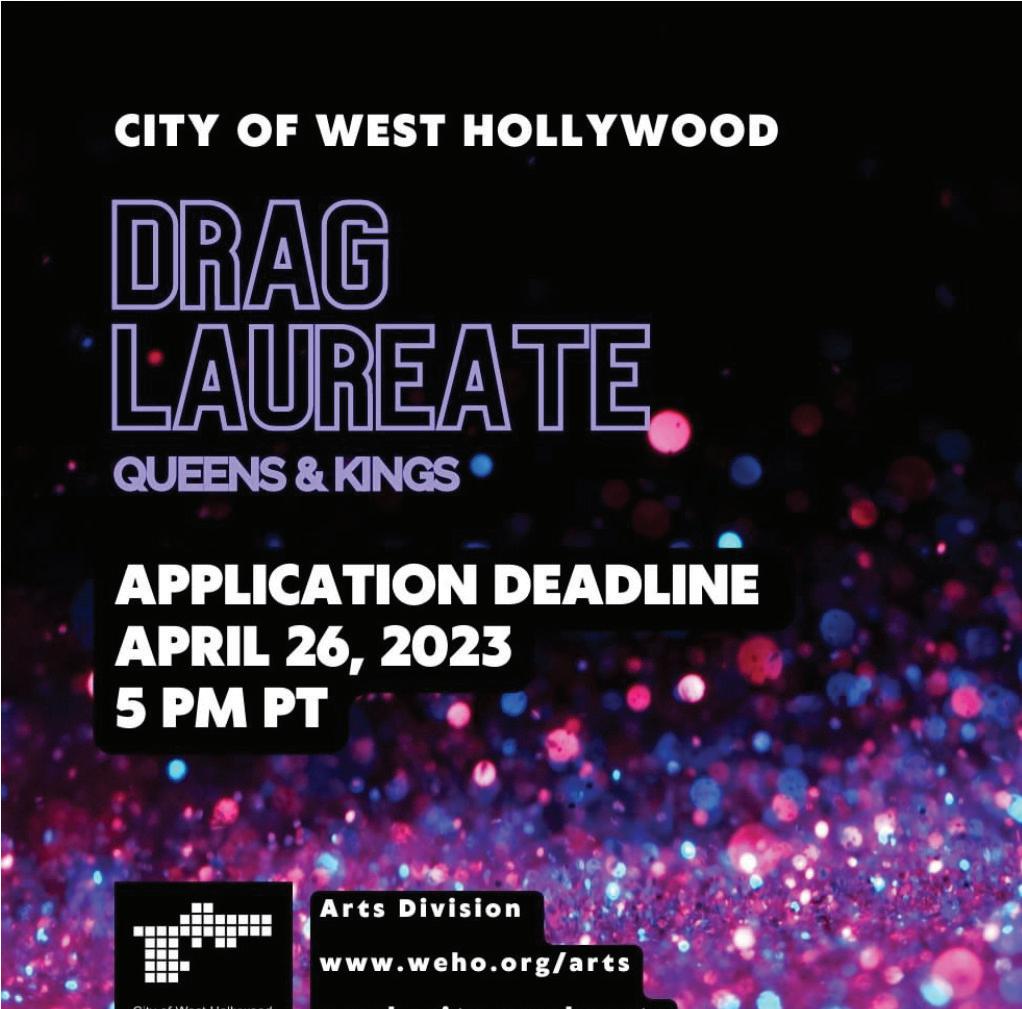

Three lawmakers on Tuesday introduced a bill that would require the U.S. to promote LGBTQ and intersex rights abroad through its public policy.
U.S. Reps. Robert Garcia (D-Calif.) and Sara Jacobs (D-Calif.) introduced the International Human Rights Defense Act. U.S. Sen. Ed Markey (D-Mass.) has sponsored the bill in the U.S. Senate.
Garcia, the former mayor of Long Beach, Calif., of Peruvian descent who represents California’s 42nd Congressional District, last November became the first openly gay immigrant elected to Congress. Garcia on Tuesday noted to the Washington Blade during a telephone interview the International Human Rights Defense Act is the first bill he has introduced.
“These issues around global human rights are ones that unfortunately, many aren’t codified into law,” he said.
Garcia said the U.S. has “different levels of global involvement,” depending upon who is president. He added the bill is “a great way of codifying an important office for us at the State Department, but also a series of measures and reports that will ensure that we’re promoting (LGBTQ rights) abroad.”
President Joe Biden in 2021 signed a memorandum that committed the U.S. to promoting LGBTQ and intersex rights abroad as part of the Biden-Harris administration’s overall foreign policy.
Then-Secretary of State John Kerry in 2015 announced the creation of the special envoy for the promotion of LGBTQ and intersex rights abroad. The White House in 2021 named Jessica Stern, who was previously the executive director of Outright International, a global LGBTQ and intersex rights group, to the position.
Former President Donald Trump tapped then-U.S. Ambassador to Germany Richard Grenell to lead an initiative
that encouraged countries to decriminalize consensual same-sex sexual relations. Then-State Department spokesperson Ned Price during a 2021 interview with the Blade said the decriminalization of consensual same-sex sexual relations is one of the Biden-Harris administration’s five priorities as it relates to the promotion of LGBTQ and intersex rights overseas.
ations and Related Programs Subcommittee, and U.S. Rep. Barbara Lee (D-Calif.), who is the ranking member of House State, Foreign Operations and Related Programs Subcommittee. The groups urged lawmakers to increase funding of the State Department’s Global Equality Fund to $40 million and U.S. Agency for International Development’s Inclusive Development Hub’s Protection of LGBTQI+ Persons to $30 million in fiscal year 2024.
“We are grateful to you for your dedication to global LGBTQI+ rights programs over the last five fiscal years, including the additional $25 million increase to these programs within the Fiscal Year 2023 Consolidated Appropriations Act,” reads the letter. “These investments have provided flexibility to the State Department and USAID to scale already existing programs and develop new mechanisms to quickly deploy funding to LGBTQI+ organizations across the globe.”
“Even with these increases, the State Department and USAID continue to face significant funding gaps to address the needs of LGBTQI+ communities impacted by COVID-19, rising authoritarianism, and humanitarian crises,” adds the letter.
Markey and then-California Congressman Alan Lowenthal introduced the International Human Rights Defense Act in 2021.
The Human Rights Campaign, the Council for Global Equality and Equality California are among the 111 organizations that signed a March 24 letter to U.S. Sen. Chris Coons (D-Del.), who chairs the Senate State, Foreign Oper-
The White House has sharply criticized last week’s passage of a bill that would further criminalize homosexuality and LGBTQ and intersex people in Uganda. Vice President Kamala Harris on Monday spoke about her support of LGBTQ and intersex rights during a press conference with Ghanaian President Nana Afuko-Addo that took place in Accra, the Ghanaian capital.
Garcia described the Uganda bill to the Blade as “awful” and added “a big part of why we’re having this discussion now is that there are countries across the world that are criminalizing same sex relationships.”
MICHAEL K. LAVERSThe New York City Police Department announced that detectives have made arrests in a string of drug-facilitated robberies of men who visited LGBTQ bars in Manhattan’s Hell’s Kitchen neighborhood that resulted in two deaths.
Robert Demaio, 34, was charged with murder, robbery, grand larceny, identity theft and conspiracy in connection with the death of a 33-year-old D.C. resident and political consultant, John Umberger, and in a separate incident in which an unidentified victim did not die, the NYPD told NBC News.
Last month the New York City Medical Examiner’s Office ruled Umberger’s death and the death of another man, Julio Ramirez, a gay 25-year-old social worker who died in the back of a taxi cab a year ago also after visiting a popular,
multilevel gay venue in the heart of the Hell’s Kitchen, homicides caused by a “drug-facilitated theft.”
Multiple drugs were found in both men’s systems, including fentanyl, lidocaine and cocaine.
NYPD spokesperson told media outlets that detectives are searching for another suspect in the drug-induced slayings, Jayqwan Hamilton, 35.
The New York Post reported that Demaio, who was indicted on murder and robbery charges last month, surrendered to police at the NYPD’s 5th Precinct in Chinatown Monday, two days after another alleged robbery crew member, 30-year-old Jacob Barroso, turned himself in.
NBC News said that according to law enforcement sources, last week a Manhattan grand jury indicted several
suspects in connection with the deaths of Umberger and Ramirez.
Once the victims were “incapacitated to the extent that their ability to perceive events became diminished,” according to an indictment, the five co-conspirators would then steal their victims’ cell phones and credit cards and use the physical cards and information stored on the victims’ phones to transfer money to themselves and make purchases.
Officials also told NBC News that the five suspects were targeting victims for financial gain and not because of their sexual orientation. However, they added that the NYPD’s Hate Crime Task Force is assisting in the investigation.
FROM STAFF REPORTS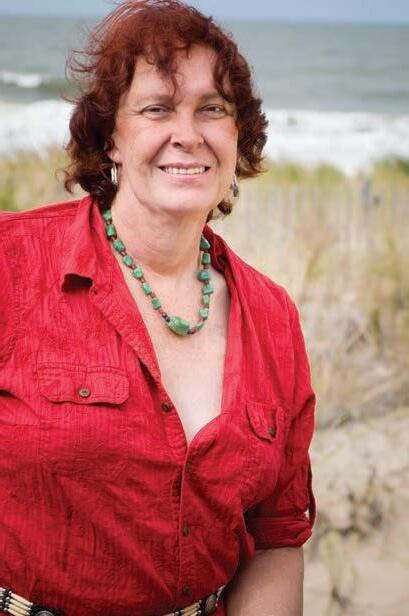

























JOHANNESBURG — South Africa on March 21 marked its Human Rights Day, notably known as Sharpeville Day in Vereeniging to commemorate those who died in 1960 during the Apartheid regime as they fought for democracy.
Although South Africa is one of the most progressive countries in the world when it comes to the advancement of LGBTQ+ and intersex rights, many Transgender people feel as though the government has not done enough to protect them.
One of the most pertinent issues about which Trans people often complain is the lack of urgency around hormone therapy within the public health care system and the Department of Home Affairs’ lackadaisical approach when it comes to gender identity on their national identification cards.
Zade de Kock is a Trans nonbinary person who has lived in South Africa since the beginning of 2019.
“I have learnt to understand that I don’t feel comfortable identifying with the gender that I was assigned at birth,” said de Kock. “This means that the gender marker on my birth certificate does not accurately define who I am. This is unfortunately the only document that inaccurately defines me, things like my bank card, passport, and any official website that may need my ID number immediately label me incorrectly. This causes major gender dysphoria which is detrimental to my mental health and it is something that cis-gender people could never fully grasp.”
“It’s undeniable that South Africa has been quite progressive compared to other countries when it comes to understanding the lives of the LGBTQ community but as our community
grows so should the understanding of those around us,” added de Kock. “Transgender and nonbinary people of South Africa need to be understood and respected for the humans we are. We are members of every society and we are contributing to life and bliss just like everyone else. We demand to be seen, thus, we ask that we get recognized on official documentation.”
Iranti, an LGBTQ+ and intersex rights group, said it is now important to sit down with policy makers to ensure LGBTQ+ and intersex people are not left behind.
“Whilst we celebrate gains that affirm human rights, such as the National Assembly finally passing the Prevention and Combating of Hate Crimes and Hate Speech Bill, which aims to clamp down on various forms of hate speech in South Africa as well as … the Human Rights Commission’s recent Equality Court victory against racist and homophobic musician Steve Hofmeyr for his hateful, homophobic statements regarding LGBTIQ persons, we cannot ignore the ways in which the state continues to fail the LGBTIQ community,” Iranti Communications and Media Manager Nolwazi Tusini said.
“In South Africa, no express law exists for Transgender and nonbinary persons to amend their gender markers on their identification documents, except for Act 49. Act 49 allows Transgender persons, who have begun their medical transition, (hormonal or surgically) and intersex persons to change the sex descriptor on their identity documents, to reflect their gender identity. This law has been challenged by Trans and intersex movements, who have applied for amendments with the DHA (Department of Home Affairs),” Tusini further noted.
“The DHA has since promised that the soon to be published National Identification and Registration Bill of 2022 will finally resolve issues of legal gender recognition by removing gender markers from South African identity numbers. Iranti is looking forward to offering public comment to this bill and hopes that the passing of this bill will not be delayed for four years, as happened with the crucial Hate Crimes Bill.”
Tusini also complained about the manner in which intersex babies and children still undergo surgeries to make their sex characteristics fit the male or female binary.
“IGM (Intersex Genital Mutilation) still takes place in several hospitals in South Africa, under other names like corrective surgery, causing severe mental and physical pain and suffering as there is no current law that makes IGM unlawful in South Africa,” Tusini noted. “We need legal protection for intersex people, and we are requesting a sit-down discussion between ourselves and policy makers to put an end to this practice. There is no health risk to being intersex. Children should be allowed to decide for themselves what should happen to their bodies.”
“We reiterate our call for President Cyril Ramaphosa to explicitly commit dedicated State officials and State resources to ensure an end to discrimination and violence against LGBTQI people, as envisaged by our constitution,” Tusini added. “This is crucial in order to promote respect for basic human rights for all and restore and uphold human dignity in line with the Bill of Rights, as promised by the presidency in a recent press release.”
DANIEL ITAINEW DELHI — The world’s largest democracy is at the crossroad of monumental change.
India’s more than 2.5 million LGBTQ+ and intersex people are looking at the country’s Supreme Court with great hopes because it will hold another hearing on marriage equality on April 18.
The five justices on March 13 heard the issue.
The Supreme Court last Dec. 14 asked the Indian government to respond to two petitions seeking a transfer of marriage equality petitions before the Delhi High Court to itself. The government on March 12 filed a response to the Supreme Court.
The government opposed legal recognition of same-sex marriage and told the highest court that same-sex couples living together as partners and having a sexual relationship with the same sex individual, which is now decriminalized, is not comparable with Indian family unit — a husband, a wife and a child born out of the union. The government also told the Supreme Court that same-sex marriage is not compatible with the Indian ethos and morality.
According to the response filed by the government in the high court, the institution of marriage is crucial in India. It provides a sense of safety, security and companionship for the members of society. It plays a crucial role in the rearing of children and impacts their upbringing. While objecting to samesex marriage in India, the federal government said that marriage between a biological male and female fall under personal law or laws — the Hindu Marriage Act of 1955, the Christian Marriage Act of 1872, the Parsi Marriage and Divorce Act of 1936, the Special Marriage Act of 1954 and the Foreign Marriage Act of 1969.
The April 18 hearing will be live telecast on the Supreme Court’s website and YouTube.
“The Indian Constitution gives equal rights to everybody. You cannot differentiate based on the gender of the people. Whether it’s the Transgender rights bill or abrogation of section 377, everyone has recognized the presence of the LGBTQ community,” said Vijay Nair of Udaan Trust, an organization based in Mumbai. “How can you discriminate just based on male or female? The constitution does not discriminate based on gender, but the people running the constitution are now doing that, which is very unethical.”
Nair, while talking with the Washington Blade, said that he has faith in the Supreme Court as the court will give the verdict based on justice prevailing for anyone in the society, whether it is positive or negative or neutral, the court will deliver justice and will treat everyone equally.
Law and Justice Minister Kiran Rijiju, while appearing on India Today Conclave, a news TV program that invites experts, politicians and think tanks to discuss different issues in the country, on March 18 said Parliament must debate same-sex marriage and draft a law because it has representatives from across the country. Rijiju suggested that the Supreme Court could later change the status if it finds the decision against the spirit of the constitution.
Nair, while reacting to Rijiju’s statement, told the Blade that it is always good to take people on board because it should be a consultative process.
“People should not be unaware of things and it is always good to have people’s consultation,” said Nair. “We are okay with the process.”
Sadam Hanjabam, founder of Ya_all, an LGBTQ+ and intersex rights organization based in Manipur, told the Blade the government still looks at the family from the angle of male and female.
“If we look into the judgment of section 377, where it was said that homosexuals were criminal. But again, the judgment conflicts this time when saying two people who love each other must be a man and a woman. The government needs to reconsider the fact from the point of human beings rather than just gender,” said Hanjabam. “It is a very long route going through the Parliament as tried earlier. Many of the members of Parliament are unaware of this issue. So even if it is discussed or brought up in the Parliament, it is a new issue to them, and it is not an important issue to them. So, the best way is to go to the Supreme Court because it was the Supreme Court who removed section 377.”
The Supreme Court in 2018 struck down Section 377, a colonial-era law that criminalized homosexuality in India.
While there is a wide discussion going on in the country on same-sex marriage, a group of former judges on March 24 publicly opposed marriage equality.
“We respectfully urge the conscious members of the society including those who are pursuing the issue of same-sex marriage In Supreme Court to refrain from doing so in the best interest of Indian society and culture,” reads the statement. “The marriage, as well as the family system in India, is sui generis. In our humble opinion, legalizing same-sex marriage will strike at the very root of the family system and thus will have a devastating impact on society at large.”
ANKUSH KUMAR


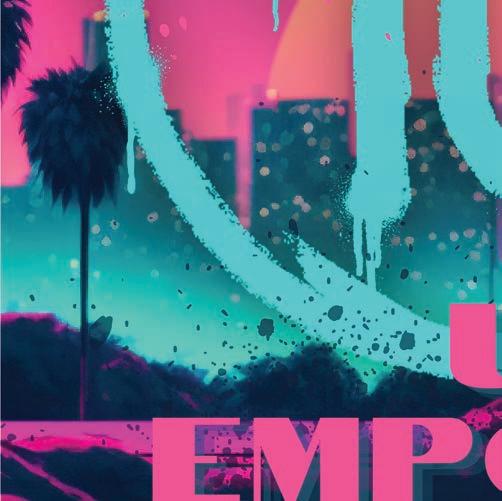




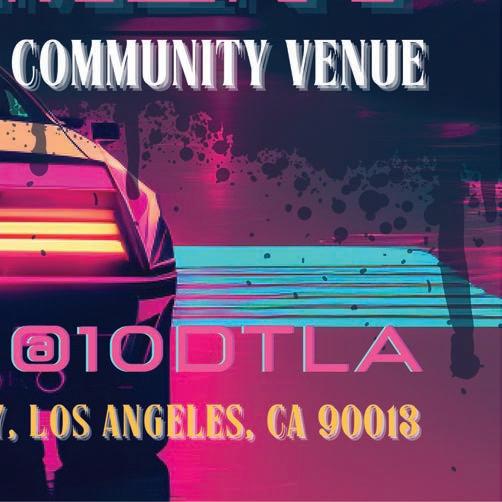
Many of us have lived the contradiction. We have had friends and/or family members loving and supporting us to our faces, but facing a ballot box, vote for someone eager to do us harm. Do they really love us?
We are collectively experiencing such a situation as a community, a back-stabbing characteristic of when Julius Caesar uttered “E Tu Brutus,” as his best friend’s knife came hurling towards him. This time the victim is not some classical politician however, it is a group of our most vulnerable — our LGBTQ kids who are getting the steely betrayal.
American conservatism has been incredibly callous towards children in general. When three Christian kids were gunned down recently, leading conservatives publicly shrugged their shoulders and said the silent part out loud, “We are not going to help you.” They have made it clear that in a choice between guns and children, guns win.
It is in this crucible of priorities that current conservative strategists live, and within their strategies, a distracting scapegoat has needed to be found and opportunistically vilified.
For this brand of American conservatives, that group of scapegoats is transgender kids. Certainly the conservatives are after people of color, women, immigrants, the LGBTQ community as a whole, but are deadlocked most severely on the transgender teen, and if that teen is athletic – they receive the pinnacle of ire.
Conventional thought would assume that the targeted teen transgender athletes might find their greatest safe harbor and advocacy in a publication called Outsports.
Outsports is the premier LGBTQ news website that deals with issues and personalities in amateur and professional sports. With articles boasting titles such as “Sports need to discuss cisgender discomfort over transgender athletes winning,” a teen feeling bullied and beaten by the reigning Republicans in transphobic state houses might feel at home.
Don’t get comfortable.
Cyd Zeigler, co-founder and editor of Outsports has announced, “I just registered as a Republican for the first time in 20 years.” (“He’s ALWAYS been ‘a Republican’ philosophically,” one source who works closely with him reports.)
Zeigler’s excuse for aligning with a party that has made transphobia a platform, is the indictment of Donald Trump. He fumes the Republican talking point that the Democrats are “seeking
to use the government to attack political foes.” This motivation alone calls into question Zeigler’s competency in leading a transgender affirming publication. The discussions around trans rights are to educate with facts to offset Republicans’ vapid transphobic talking points. That he embraces such thin politically manipulative talking points around a judicial case, of which no one has yet seen the specifics and cannot sincerely evaluate, let alone judge, makes him a slave to politics and a betrayer of principle.
To add further insult to injury to the trans community, and to be, as athletic rights expert Dr. Veronica Ivy calls him, “a danger to trans people,” Zeigler has aligned himself with probably the most transphobic wing of Republicans he can. “Thank you @GovRonDesantis,” he tweets.
Thanking Ron DeSantis, the governor who spent the first day of Pride month in 2021 signing one of the first anti-trans athlete bills into law. Jaw drop. Thanking Ron DeSantis, not only an American conservative adhering to the plan to scapegoat LGBTQ kids and erase them, but who is arguably the architect of that plan.
It might be one thing if Zeigler had aligned himself with a Republican governor who vetoed a transphobic bill like Utah’s Republican Gov. Spencer Cox, but no, Zeigler opted to go full traitor. Being asked to trust a media player who in secret does not have your best interests at heart, is possibly becoming “normal.” We in the LGBTQ community have an editor power-player embracing the political mastermind of transphobic and LGBT erasure politics, and the conservatives? Well, they have Tucker Carlson who secretly “hates Trump passionately.”
While Trump-ian Richard Grenell and Zeigler’s sister “Jess Z” applaud him, “So proud of my brother!” car dealer Jess exclaims, we have to send deep condolences to his staff, none of whom deserve this disrespect.
As for the LGBTQ community, and our teens in particular, John Casey of the Advocate asks, “Does Zeigler honestly have your best interests at heart? Does he truly represent what it means to be queer? Would you feel safe going to Zeigler?”
Our teens need, nay, they crave a hero who unflinchingly has their backs. Zeigler likes to cite his “many many years of advocating for trans people,” as his defense.
Yeah, well, that was then. This is now.
You, Mr. Zeigler, are no hero. You are a Tucker.
ADDRESS
8237 Blackburn Avenue Ste. 201, Los Angeles, CA 90048
PHONE 310-230-5266
E-MAIL tmasters@losangelesblade.com
INTERNET losangelesblade.com
PUBLISHED BY Los Angeles Blade, LLC
PUBLISHER
TROY MASTERS
tmasters@losangelesblade.com
310-230-5266 x8080 (o), 917-406-1619 (c)
SALES & MARKETING
SALES EXECUTIVE
CHRIS WILMORE
cmwilmore@losangelesblade.com
310-230-5266 x9461
NATIONAL ADVERTISING
RIVENDELL MEDIA
sales@rivendellmedia.com, 212-242-6863
MARKETING DIRECTOR
STEPHEN RUTGERS
srutgers@washblade.com, 202-747-2077 x8077
EDITORIAL
CONTRIBUTING WRITER
KAREN OCAMB
karenocamb@losangelesblade.com
NATIONAL EDITOR
KEVIN NAFF
kna @washblade.com, 202-747-2077 x8088
EDITOR AT LARGE
BRODY LEVESQUE
California
CONTRIBUTORS
MICHAEL K. LAVERS, TINASHE CHINGARANDE, ERNESTO VALLE, YARIEL VALDÉS GONZALEZ, PARKER PURIFOY, CHRISTOPHER KANE, AUSTIN MENDOZA, JOHN PAUL KING, JOEY DIGUGLIELMO, CHRIS JOHNSON, LOU CHIBBARO JR., REBEKAH SAGER, JON DAVIDSON, SUSAN HORNIK, CHANNING SARGENT, SAMSON AMORE, CHRISTOPHER CAPPIELLO, MICHAEL JORTNER, DAN ALLEN, SEAN SHEALY, SCOTT STIFFLER, RHEA LITRÉ
CREATIVE DESIGN/PRODUCTION
AZERCREATIVE.COM
DISTRIBUTION
CHRISTOPHER JACKSON, 562-826-6602
All material in the Los Angeles Blade is protected by federal copyright law and may not be reproduced without the written consent of the Los Angeles Blade. e sexual orientation of advertisers, photographers, writers and cartoonists published herein is neither inferred nor implied. e appearance of names or pictorial representation does not necessarily indicate the sexual orientation of that person or persons. Although the Los Angeles Blade is supported by many ne advertisers, we cannot accept responsibility for claims made by advertisers. Unsolicited editorial material is accepted by the Los Angeles Blade, but the paper cannot take responsibility for its return. e editors reserve the right to accept, reject or edit any submission. A single copy of the Los Angeles Blade is available from authorized distribution points, to any individual within a 50-mile radius of Los Angeles, CA. Multiple copies are available from the Los Angeles Blade o ce only. Call for rates. If you are unable to get to a convenient free distribution point, you may receive a 26-week mailed subscription for $195 per year or $5.00 per single issue. Checks or credit card orders can be sent to Phil Rockstroh at prockstroh@washblade.com. Postmaster: Send address changes to the Los Angeles Blade, PO BOX 53352 Washington, DC 20009. e Los Angeles Blade is published bi-weekly, on Friday, by Los Angeles Blade, LLC. Rates for businesses/institutions are $450 per year. Periodical postage paid at Los Angeles, CA., and additional mailing o ces. Editorial positions of the Los Angeles Blade are expressed in editorials and in editors’ notes as determined by the paper’s editors. Other opinions are those of the writers and do not necessarily represent the opinion of the Los Angeles Blade or its sta To submit a letter or commentary: Letters should be fewer than 400 words; commentaries should be fewer than 750 words. Submissions may be edited for content and length, and must include a name, address and phone number for veri cation. Send submissions by e-mail to tmasters@losangelesblade.com.
is the host of the Hollywood-based radio/podcast show RATED LGBT RADIO.
is vice president of external affairs for Public Justice, a national legal advocacy organization. He previously worked as director of communications for Servicemembers Legal Defense Network and Immigration Equality.
The recent deluge of anti-LGBTQ bills being passed in state legislatures throughout the country has rightly captured significant media attention in recent months, and helped to reignite a sense of urgency and passion among civil rights advocates.
From Florida’s “Don’t Say Gay” bill to the heinous legislation from Tennessee lawmakers targeting drag shows and the transgender community, these bills have also underscored that, despite significant gains such as the repeal of “Don’t Ask, Don’t Tell” and the national recognition of marriage equality, our rights and our very existence remain under attack, and under threat, in many parts of the country.
Yet, while these bills have rightly garnered the attention of the LGBTQ+ community, there is another, more stealth, attack on our rights and liberties under way that has received comparatively little attention, despite having a sweeping and devastating impact on civil rights. That attack is on the courts and, specifically, every American’s right to seek justice through our judicial system.
It is no mystery that the courts have been the cornerstone of our community’s pursuit of justice and equality. For years, the courts were far ahead of legislatures, both state and federal, in chipping away at anti-LGBTQ equality. And heroic, forward-looking organizations like Gay & Lesbian Advocates and Defenders (GLAD), Lambda Legal and the National Center for Lesbian Rights (NCLR) developed brilliant legal strategies to win critical victories for the community.
But today, the courts are being used to lock us all – LGBTQ+ people included – out of the justice system.
One key way this is happening is the widespread use of forced arbitration clauses, the “fine print” language found in numerous contracts that govern the everyday lives of most Americans.
While many see such clauses as annoying, necessities for signing a cell phone contract or opening a new credit card account, they are increasingly used in even more substantial and pervasive ways.
Indeed, most employers now require workers to sign employment contracts that include forced arbitration clauses, meaning those workers will find significant hurdles to ever holding an employer accountable in court, and will be forced to bring their case in secretive arbitration proceedings where the arbitrator is usually chosen by the defendant.

And, as Public Justice Board Member Myriam Gilles recently testified before Congress, when such clauses are included in contracts, not even federal legislation like The Equality Act can help.
“In fact, corporations can violate all the statutes that Congress enacts and the state legislature enacts,” Gilles told out Congressman Mondaire Jones. “And we might not ever know about it because … these cases are shunted into hermetically sealed private arbitrations. Those arbitrations are not made public. There’s no recording of those arbitrations. There’s no court reporter. There’s no precedent for an arbitration decision. And so, violations of law are happening and they’re going undetected. And so I think this is … a real crisis in American law at this moment.”
Then, Gilles went on to explain that, even if The Equality Act become federal law, “those protections, those laws mean nothing if they can’t actually be enforced.”
And yet, in the last Congress, there was virtually total silence from national LGBTQ+ organizations when Congress introduced legislation, The FAIR Act, to largely do away with such forced arbitration clauses. This, despite the Leadership Conference on Civil & Human Rights (LCCHR) noting that “forced arbitration agreements and class action waivers are an impediment to the enjoyment of basic civil and human rights,” and that “millions of working people do not have access to the courts to enforce their rights under all types of employment and civil rights statues, including Title VII of the Civil Rights Act, the Americans with Disabilities Act, the Family and Medical Leave Act, the Fair Labor Standards Act, and more.”
Despite dire warnings, the Human Rights Campaign has not tracked lawmaker support for The FAIR Act as part of its Congressional scorecard, and little, if any, of LGBTQ+ advocacy organizations’ bandwidth has been dedicated to passing the bill.
That needs to change, and the 32 Members of the Congressional LGBT Equality Caucus who didn’t support the legislation last time around must be brought onboard in this Congress, too.
And just as urgently, our community’s advocacy organizations and Congressional allies also must be ready to defeat the other attack on access to justice expected to make a return in Congress: The movement to virtually wipe away class action lawsuits.
Republican leaders in the House are expected to reprise their 2017 attempts to attack class litigation. Their last bill, had it succeeded, would have made historically important class action lawsuits, like Brown v. Board of Education, nearly impossible to bring to the courts. Far from being just about consumer lawsuits and curtailing dangerous products, class lawsuits continue to be an important vehicle for civil rights cases as well. Lambda Legal, in particular, has expertly litigated class action lawsuits to obtain Social Security survivor benefits for same-sex couples (in Thornton v. Saul) and to ensure transgender West Virginians have access to gender affirming healthcare (in Fain v Crouch) – to name just two examples.
No wonder LCCHR, in opposing the 2017 bill targeting class litigation, warned that it would “have a chilling effect on people of color, the elderly, and others to bring civil rights class action suits,’ noting that “class actions are critical for the enforcement of laws prohibiting discrimination in employment, housing, education, and access to public areas and services.”
In both cases – the attack on our right to a day in court and the attack on class action lawsuits – our ability to continue to create positive change through the courts is in dire jeopardy. And so it is imperative that, in this Congress and beyond, these attacks receive the energy, attention and advocacy they deserve. Otherwise, the plethora of federal legal protections now being nobly pursued by our advocacy organizations in Washington will be largely toothless as corporations, the far right and their allies in Congress continue to undermine those efforts by locking the courthouse doors.
LOS ANGELES – Most of us are probably aware of “Kiss of the Spider Woman” either as an acclaimed 1993 stage musical by “Cabaret” and “Chicago” composers John Kander and Fred Ebb and queer playwright Terrence McNally, or as an acclaimed 1985 film starring Raul Julia and William Hurt – the latter of whom became the first actor to win an Oscar for playing a queer character (and also the first of 8 straight-identifying actors to win for playing queer, but that’s another story).
Many of us also know that before any of that, it was a 1976 novel by Argentinian author Manuel Puig, who wrote it while living as an exile in Greenwich Village after a military coup d’etat placed his native country under the rule of a brutal and repressive military dictatorship.
grow to understand, even to love each other – as a crux which “takes on new relevance in today’s polarized climate.” He also points to the surprising amount of humor and playfulness contained in the story, as well as the importance of language in driving it.
Language is particularly crucial for a version that tells the story without the help of the kind of elaborate conceptual conceits and visual storytelling aids available to a big-budget film or Broadway musical – and that means the burden of using it effectively falls on the two actors playing Valentin and Molina: Ed F. Martin and Adrián González, respectively.

The Blade spoke with both of them about the challenges they faced in tackling two roles already made famous in the public imagination by the novel’s high-profile previous iterations, and their answers underscore all the reasons why “Kiss of the Spider Woman” is still, perhaps more than ever, an essential touchstone for queer culture.
For Molina, it was all about finding the right understanding of Molina.
“Previous versions did not affect me, or at least I didn’t borrow from them. I saw the film way back when, and I was even in a production of the musical — playing the Warden of all things. But I just kind of came in as myself – and a little bit of my mother – and dove into the rehearsals with whatever Adrian and Michael brought to the table. And the deeper we went, the more I fell in love with Molina as a person.”
“I come into this as a Latino gay man,” he explains. “I thought of Molina as a gay man, but in reading the novel and breaking down the play, I came to recognize that Molina could be a transgender woman – it’s hard to say definitively, today being so different from 1975, but I think Molina thinks of herself as a woman, and she emulates the glamorous women of the 40s and 50s from the films she loves so much.”
As for González, he tells us he wasn’t familiar with either the musical or the film.
“I’ll admit that when I was auditioning for the role and doing some research, I watched a few scenes from the film. I didn’t find anything special to hold on to – I love Raul Julia, but we are different people, and honestly I think the story the film is telling is different from the story we are telling. For me, Valentin is a man who is passionate in his beliefs and would do anything to help change the world for the better. That was the thing that struck a chord with me.”
Elaborating, he explains, “Our approach for the characters – particularly Molina – is what makes our story special and very relevant today. We treat her as a trans woman, in a time and world where there was no language or acceptance of her – and she ends up finding it in an unlikely person like Valentín, which is what makes this story truly special.”
What most of us DON’T know, perhaps, is that before the mainstream success of the novel’s now-classic film and stage adaptations, there was another version of the story, adapted into a 1983 play by Puig himself and translated into English by Allan Baker for a 1985 London premiere starring Simon Callow and Mark Rylance.
It’s that adaptation of the work which is now onstage at LA’s A Noise Within theatre company, and its timing couldn’t be better – because while the book’s more famous adaptations, each a product of their time and limited by a lack of existing language in their efforts to fully explore its complex themes about sexuality and gender, might feel a little dated to many of us 2023, a fresh take from a more informed perspective is all that’s needed to do justice to the material and reveal the authentic queer voice that has been inside it all along.
For those who need a refresher, “Spider Woman” is an intimate, two-character drama set in a Buenos Aires prison cell, where Valentin – a macho political prisoner whose commitment to the Marxist cause takes precedence over everything else – is thrown together with Molina – a queer, movie loving dreamer who escapes the harsh reality of prison life by retelling the stories of his favorite film noir classics and drawing inspiration from their glamorous leading ladies. The two cellmates are mismatched, to say the least, but they somehow manage to form an unlikely relationship.
In his press notes for the new production, Michael Michetti sees the dynamic between these two diametrically opposed characters – who, stuck together in an oppressive environment,
Martin agrees. “These two people are polar opposites in their views, but in an enclosed space they are forced to get to know each other, to hear a different point of view, to learn from each other and, finally, to find common ground or a connection. Looking at where we are today as a country – politically, socially, culturally – the play might teach us a thing or two about how to treat each other with respect as we go back and forth expressing ourselves and our opposing values, or philosophies, or whatever we call them. The thing that really makes it relevant is the need for listening.”
González concurs, chiming in, “We can’t seem to agree on issues that truly are basic human rights, and a willingness to have conversations and listen to each other is completely off the table, there’s just a lack of empathy for one another. And meanwhile, the rights of people within the LGBTQ+ community are being attacked.”
The story’s potential as a catalyst for change even extends to the actors themselves. As Martin tells us, “I have loved getting to know and figure out Molina, letting that character be who they are without labels regarding sexual orientation, or gender identity, or anything. There are many reactions Molina has in the story that I have myself in real life – for good and for bad – and, interestingly enough, it made me wonder about myself. As I said, I identify as a gay man – but thanks to this role, I am wondering now if I even need that label?” González, summing up, expresses his hope that audiences find their hearts and their minds equally opened by experiencing “Spider Woman” with them.
“I believe that theatre, and stories like this one, help shape the world we live in. Whether we agree or not on certain issue, if we’re able to face each other with empathy and an open heart, we can help change the world together.”
“Kiss of the Spider Woman” performs at A Noise Within, 3352 E Foothill Blvd, Pasadena, from April 1 – 23.
 By JOHN PAUL KING
By JOHN PAUL KING
Drag is all over the news these days, and rightly so. After all, drag queens and kings are currently standing alongside their trans siblings on the front lines of the latest raging battle against the queer community by extremist bigots bent on legislating us all out of existence.
What’s particularly chilling about the current focus on drag culture as a nexus for all that – according to the haters – is “evil” about the queer community is that, in the last decades, it has experienced a surge in popularity that extends deep into the mainstream. This, of course, is why it’s being targeted now; with LGBTQ acceptance already the norm for a rising generation of Americans, the anti-LGBTQ conservatives are ramping up their efforts to push back the tide, and they are doing it in the most time-honored (and insidious) way possible – by positioning themselves as “protectors” of children and advancing the lie that being queer is somehow synonymous with being a pedophile.
Drag, of course, is an ancient art that has nothing to do with sex or sexuality; there’s something deeply human about it, an expression of some natural fascination with gender lines that, by acknowledging it, gives us permission to cross them – or, at the very least, to not take them so seriously. What most “outsiders” to the culture know about drag (and the people who do it) is limited to what can be seen in the performance – the “show” part of the equation, rather than the “human” – and that leaves a dangerous amount of room for projection and interpretation from anybody who thinks that any divergence from strictly drawn social norms is an existential threat.
That’s why the April 4 VOD release of “Chrissy Judy” – the first feature film from writer, director, and star Todd Flaherty, which premiered at last year’s Provincetown Film Festival and went on to become a fan favorite at LA’s OutFest, New York’s NewFest, and multiple other queer film festivals on the circuit – feels particularly well-timed; while there have been plenty of movies about drag performers, it’s hard to think of another that gets past all the assumptions and clichés about drag (and queer life in general, for that matter) to connect with universal human experience as this one.
Presented in black-and-white and overcoming its lower-budget indie production values with an evocative, elegantly cinematic aesthetic, it’s the story of Judy (Flaherty), who is determined to make a breakthrough into the New York drag scene as part of a two-queen act with his BFF and drag sister Chrissy (Wyatt Fenner) despite years of trying with little success. Now, on the eve of a potentially game-changing gig, Chrissy breaks the news that he’s leaving the act to move in with his Philadelphia boyfriend and settle down into a com-
fortable, domesticated life; forced to reinvent himself as an aging solo act (both onstage and off), Judy struggles to move forward, but he can’t quite let go of the severed connection that prevents him from discovering who he is capable of being on his own – and it doesn’t help that, without the balancing influence of Chrissy in his life, there’s nothing to prevent his “hot mess” appetites and impulses from getting in his way.
Most notably unique about “Chrissy Judy,” perhaps, is that it doesn’t treat its central relationship as if it were a “straight” one. It cannot be defined in strict terms of “friendship” or “love” but exists as a blend of the two, a complex mix of emotional attachments and desires that may not have an exact parallel in heterosexual experience. The nuances of this dynamic are played with exquisite delicacy by Flaherty and Fenner, whose chemistry together helps us all connect to our own memories of that one special friend who has remained close to our heart despite all the time, distance, and drama that may have ever come between you.
There are also excellent performances from Joey Taranto, whose charm helps to keep him likable as a potentially toxic new acquaintance that enters Judy’s orbit, and James Tison, who has a hilarious and memorable turn as Samoa, an old friend who invites him to a party and spouts buzzy-sounding mantras about manifestation at him.
It’s Flaherty’s film, however, and he proves himself remarkably confidant and capable both as a filmmaker and as a star by delivering a well-wrought, shrewdly observational movie about queer life that doesn’t pander to the sensibilities of the heteronormative world.
“Chrissy Judy” isn’t interested in presenting drag – or queer experience in general, for that matter – through a safe and sanitized filter; Judy (his “real” name is James, but he doesn’t let anyone call him that) is not exactly an inspirational figure, and his unapologetically hedonistic, self-indulgent lifestyle isn’t likely to win over any conservative homophobes. Flaherty’s writing and fiercely authentic performance make no pretense of positive representation, and — just like its main
character — his movie seems to delight in flaunting the very things that make the strait-laced crowd clutch their proverbial pearls.
That’s because it isn’t a movie made for them, though it’s certainly accessible enough for any non-homophobic viewer to connect with and even enjoy, but an authentic queer story told by a queer storyteller for a queer audience. There’s no need to be shy about its sex positivity, or ignore the importance of hook-up culture, or downplay the thrill of a sexually adventurous by moralizing about promiscuity.

There’s also no need for it to mimic the tropes of hetero-centric cinema. Indeed, it derives considerable effect by setting up our expectations – learned from the nostalgic classics so long embraced by queer culture – only to undermine them, such as with a “meet-cute” romantic subplot that takes an awkward (and messy) twist, or any number of “big break” scenarios which fizzle out and go nowhere. These details play out with a good deal of humor, but they also underscore the ironic gap between the glossy sentimentality stirred by the film’s silver-toned cinematography and the world-wise savvy reflected in a plot largely driven by the unexpected curves that real life continually throws our way.
There are things about “Chrissy Judy” we could quibble over – do we really need that many shots of makeup and hair being removed and applied in mirrors to represent Judy’s continual evolution? Even so, it succeeds in getting past the “drag” of drag and telling a story about a core human experience – the changes in our loves and our lives as we continue to grow, and the challenges of holding onto a relationship as those changes pull us further apart – with tenderness, candor, empathy, and a warm-if-sometimes-caustic sense of humor. Best of all, it manages to do all this without sacrificing its own proud sense of LGBTQ+ identity.
In a time when so much queer entertainment is marked by a self-conscious effort to curate our community’s cultural experience for the world at large, it’s refreshing to see something that allows itself simply to be queer.
‘Chrissy Judy’ is the drag buddy dramedy we all need right now
A refreshing look at something that allows itself simply to be queer

At Gilead, we understand that it’s going to take a combination of both science and social change to help end the HIV epidemic for everyone, everywhere. It’s only by collaborating with advocates and organizations across the country that we can reach this collective goal. Together, we’re working tirelessly to improve health equity and bring awareness to the HIV epidemic.

Maybe in your dreams, you’ve been to an underwear party with Alan Cumming on Fire Island or, from a seat on Air Force One, noticed the razor bumps on Barack Obama’s neck.
These dreams are part of everyday life for Ari Shapiro, host of NPR’s “All Things Considered.” In his memoir “The Best Strangers in the World: Stories from a Life Spent Listening,” he tells true tales that even a novelist couldn’t imagine.
From early on, Shapiro, who sings with the band Pink Martini and performs in the stage show “Och and Oy” with Cumming, has been both an outsider and someone who loves the spotlight.
Shapiro, 44, began speaking in public when he was a first-grader in Fargo, N.D. He and his older brother were the only Jewish kids at their elementary school. At Christmastime, “he and I would go from classroom to classroom with a menorah and a dreidel, explaining to children descended form Scandinavian immigrants what Hanukkah was,” he writes.
This was his first experience of explaining the unfamiliar — of, as Shapiro writes, “making the foreign seem a bit less strange.”
Shapiro’s parents were professors at North Dakota State University. They encouraged Shapiro to be curious about the world.
When he was eight, Shapiro and his family moved from Fargo to Portland, Ore. At 16, Shapiro came out as gay. His parents were supportive.
Though he hadn’t even kissed a boy, Shapiro writes, there
were rumors among his peers about his sexuality. “I decided that the best approach was to drown out the whisper campaign with a bullhorn,” he writes.

He plastered his locker with postcards of Tom of Finland drawings and photographs by Herb Ritts and Tom Bianchi. “On Halloween, I came to school in drag,” Shapiro writes, “After that, my calculus teacher stopped calling on me when I raised my hand in class.”
His hair, he recalls, was parted in the center, and fell to his chin in a “sort of Nirvana-meets-Prince Valiant bob.”
Shapiro, refreshingly, is not too self-serious about his coming out. Yet, when he notes that he carried Mace because “not everybody was excited about having a gay classmate,” you remember how homophobic it was then.
Shapiro, after graduating from Yale with a bachelor’s degree in English, came to NPR through an internship with Nina Totenberg. “Grow a pair,” Shapiro writes, Totenberg told him when he hemmed and hawed while asking a source for an interview. Most journalists are known primarily for their reporting. But journalism is just one facet of Shapiro’s life.
In “The Best Strangers in the World,” Shapiro lets readers in on what it’s like to have a multi-faceted life. Where one moment, he’s reporting from Washington, D.C., and the next day he’s singing with Pink Martini at the Hollywood Bowl.
Reporters, usually, don’t want to become part of the news. In 2004, Shapiro worried about that when he and his boyfriend Mike Gottlieb got married in San Francisco. “I thought I should
ask permission from my employer, NPR,” Shapiro writes, “I was about to step into the middle of the culture wars at a time when the country was undecided on whether gay couples should be allowed to legally commit to a life together.”

“As a journalist,” he added, “I would be ...becoming a participant in a major news story.”

At times, Shapiro almost comes off as being unbearably privileged – as someone’s who’s had everything go their way from love to their career.
‘The Best Strangers in the World: Stories from a Life Spent Listening’ By Ari Shapiro c.2023, HarperOne $28.99 | 256 pages

This impression is erased when Shapiro reveals that he sweats as much as Aaron, the anxious reporter in “Broadcast News.” Or, when he writes movingly about covering the Pulse massacre in 2016. As a gay man, Shapiro writes, he brought “lived experience” to his coverage of Pulse. “I had been bar hopping in Orlando more than a decade earlier,” Shapiro writes.

Then, he’d made friends with bartenders at a bar. Twelve years later, while in Orlando, Shapiro realized that that bar was Pulse.
“The Best Strangers in the World” is the best read this spring.
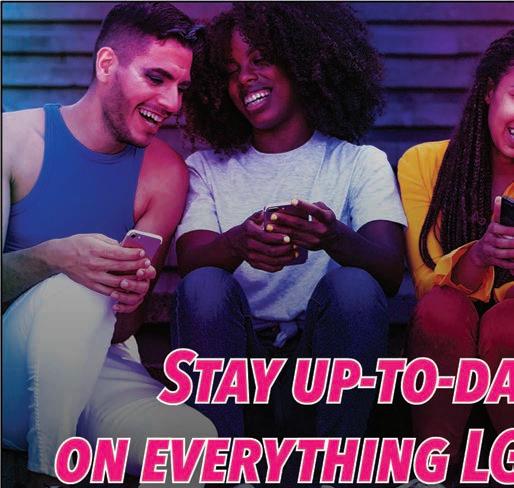
The difference in winning and losing market share is how businesses use their advertising dollars. CNPA’s Advertising Services’ power to connect to nearly 13 million of the state’s readers who are an engaged audience, makes our services an indispensable marketing solution. For more info call Cecelia @ (916) 288-6011 or cecelia@ cnpa.com
Switch and save up to $250/ year on your talk, text and data. No contract and no hidden fees. Unlimited talk and text with flexible data plans. Premium nationwide coverage. 100% U.S. based customer service. Limited time offer get $50 off on any new account. Use code GIFT50. For more information, call 1-844-908-0605
Become a Published Author. We want to Read Your Book! Dorrance Publishing-Trusted by Authors Since 1920. Book manuscript submissions currently being reviewed. Comprehensive Services: Consultation, Production, Promotion and Distribution. Call for Your Free Author`s Guide 1-877-538-9554 or visit http:// dorranceinfo.com/Cali
NEW AUTHORS WANTED! Page Publishing will help you self-publish your own book. FREE author submission kit! Limited offer! Why wait? Call now: 1-855-667-0380
THIS SPACE CAN BE YOURS!
CALL 1-916-288-6011 or email cecelia@cnpa.com
Prepare for power outages today with a GENERAC home standby generator. $0 Money Down + Low Monthly Payment Options. Request a FREE Quote -Call now before the next power outage: 1-844-439-5645
Eliminate gutter cleaning forever! LeafFilter, the most advanced debris-blocking gutter protection. Schedule a FREE LeafFilter estimate today. 15% off Entire Purchase. 10% Senior & Military Discounts. Call 1-855-424-7581
AUTOS WANTED
DONATE YOUR CAR TO KIDS Fast Free Pickup – Running or Not - 24 Hour ResponseMaximum Tax Donation – Help Find Missing Kids! Call 1-888-491-1453.
Donating your vehicle? Get more! Free Towing. Tax Deductible. Plus a $200 restaurant voucher and a 2 night/3 day hotel stay at one of 50 locations. Call Heritage for the Blind to donate your vehicle today. CALL 1-844-491-2884
GOT AN UNWANTED CAR???
Your car donation to Patriotic Hearts helps veterans find work or start their own business. Fast free pick. Running or not! Call 24/7: 1-877-529-0495.
Tiene un vehiculo no deseado?
Donelo a Patriotic Hearts! Recogida rápida y gratuita en los 50 estados. Patriotic Hearts ofrece programas para ayudar a los veteranos a encontrar trabajo o iniciar su propio negocio. Llama ahora: 1-844-244-5441 (24/7)
FREE high speed internet for those that qualify. Government program for recipients of select programs incl. Medicaid, SNAP, Housing Assistance, WIC, Veterans Pension, Survivor Benefits, Lifeline, Tribal. 15 GB internet service. Bonus offer: Android tablet FREE with onetime $20 copay. Free shipping & handling. Call Maxsip Telecom today! 1-855-480-0769
Get DIRECTV for $64.99/mo for 12 months with CHOICE Package. Save an additional $120 over 1st year. First 3 months of HBO Max, Cinemax, Showtime, Starz and Epix included! Directv is #1 in Customer Satisfaction (JD Power & Assoc.) Some restrictions apply. Call 1-888-641-5762
Over $10K in Debt? Be debt free in 24 to 48 months. No upfront fees to enroll. A+ BBB rated. Call National Debt Relief 1-888-231-4274.
SAVE BIG on HOME INSURANCE! Compare 20 A-rated insurances companies. Get a quote within minutes. Average savings of $444/year! Call 1-844-410-9609! (M-F 8am-8pm Central)
RETIRED COUPLE
$1 MIL for business purpose Real Estate loans. Credit unimportant. V.I.P. Trust Deed Company www.viploan.com Call 1-818-248-0000 Brokerprincipal DRE 01041073. No Consumer Loans.
DID YOU KNOW
Newspaper-generated content is so valuable it’s taken and repeated, condensed, broadcast, tweeted, discussed, posted, copied, edited, and emailed countless times throughout the day by others?
Discover the Power of Newspaper Advertising. For a free brochure call 916-2886011 or email cecelia@cnpa. com
